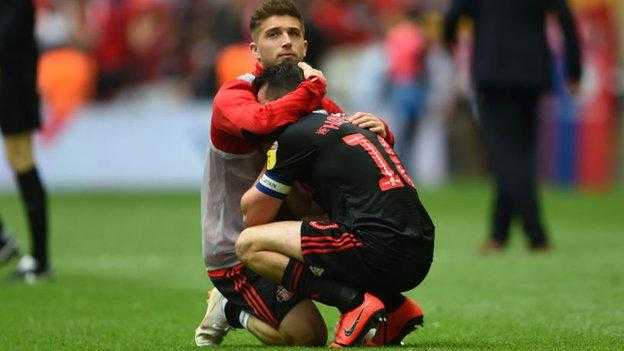Netflix isn’t afraid to think outside the box when it comes to content. From original movies to documentaries to docuseries, they’ll greenlight just about anything. In December 2018, the streaming service debuted Sunderland ‘Til I Die, a docuseries devoted to following Sunderland AFC. Season 2 dropped on Wednesday and I’ll dive into the lessons learned from watching both seasons of the docuseries.
But first, a history lesson…
About Sunderland
Located in the northeast of England, the city of Sunderland is an industrial city that’s home to shipbuilding and automobile manufacturing. The soccer club was formed in 1880 by a group of schoolteachers in the city. Since then, the club has won six Division One championships, two FA Cups, and were twice winners of The Championship. The club played at Roker Park for 99 years before constructing and moving into the Stadium of Light in 1997. (Awesome name for a stadium, by the way.) Some of the most notable players to play for the club are Sam Allardyce, Niall Quinn, and U.S. soccer star Jozy Altidore.
Sunderland AFC has been what’s called a “yo-yo” club: they’ll earn a promotion, then drop down a division and earn promotion again. In 2017, they were relegated to The Championship. That’s where Season 1 begins. The producers of this Netflix docuseries introduce the audience to the members of the club as well as the residents of the city of Sunderland.
There are several things I learned about English soccer and about sports in general after watching both seasons.
Lesson #1: You can’t be an absentee owner in sports.
I found that owners of English soccer clubs who reside outside of Great Britain are very surprising. Notable American-based owners of English soccer teams are Stan Kroenke (Arsenal), John Henry (Liverpool), and the Glaser family (Manchester United). Midway through Season 1, we find out that Ellis Short, an American who has owned the team since 2006, will make no further investment in the club. We don’t see Short until the final episode of Season 1 as he left the offices of the EFL after surrendering controlling stake in Sunderland. The team was then sold to Stewart Donald, an Oxford-based businessman.
Producers give a small glimpse into the day-to-day operations at Sunderland in Season 1. Operations were run by the caretakers – if you want to call them that – while Short sat in Florida. British-based ownership runs the club in Season 2 and it struggles to turn the club around both on and off the pitch. We discover that with absentee ownership, club executives wrote blank checks for whatever they wanted. This includes £100,000 (about $124,000 USD) used to buy a Cryochamber not for player usage, but for use by previous chief executive Martin Bain. Lack of accountability became mismanagement off the pitch and that led to bad performances on the pitch. (Word to the wise: if you own a soccer club because you can, at least check in every so often to see what the hell management is doing.)
Lesson #2: Sports are an important part of the community.
Sunderland is a working-class community and like most of England, their sense of pride is displayed in how well their local soccer club does. The Black Cats, as they are affectionately known, has seen days when they were fighting off relegation or clawing their way into a promotion. (No pun intended.) As we’re introduced to off-the-pitch staff and season ticket holders who love their club. From the club chef to the pub owner to the clergy, there is an undying devotion to the club.
You can’t help but endear yourself to them as you begin to see how much they want their team to win and earn promotion. As the “ultras” travel with the team and sing songs and chants until their throats and lungs grow hoarse, you find yourself rooting more and more for Sunderland. The producers doa fantastic job of tugging at the heartstrings of its audience throughout the docuseries in capturing the ups and downs of the Sunderland fans.
Lesson #3: Sports will find a way to break your heart.

I have endured my share of sports pain in my lifetime. As a New York Jets fan, there are way too many to count. But in this Netflix docuseries, you get to see Sunderland fans have their hearts torn out in front of their eyes on several occasions. In Season 1, there’s the controversial call in extra time that sends Sunderland into relegation for the second consecutive season. In Season 2, Sunderland fans have their hearts broken not only once, but twice at Wembley Stadium. First, it was to Portsmouth at the EFL Cup Final and in extra time to Charlton Athletic in the League One playoff final.
Sports, like many things in life, will find a way to break your heart. Fandom tests your loyalties and will have you questioning why you became a fan at all. It’ll have you asking whether or not you’ll see your team win ANY kind of championship. But in a city where the heartbeat of the people is a soccer team, their spirit lives and dies with every result. Several American cities, especially where there are only one or two pro sports teams, understand it this all too well.
Give it a Watch, Even if You Don’t Follow Soccer.
With #CoronaSZN pausing sports leagues all around the world, Sunderland sits in a three-way tie for the final spot in the League One playoffs. It’s uncertain if the EFL will resume playing this season due to the pandemic. But if it does, I’ll be rooting for the Black Cats from across the pond. And hopefully, Season 3 (if there is one) will have a happy ending.
We have many more Entertainment articles at Belly Up here! And if you want to talk about this Netflix series or sports in general, comment below or hit me up on my Twitter handle, @WhoIsRyanMcC.









